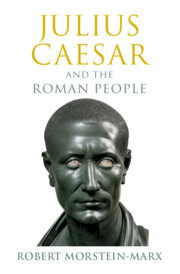Book contents
- Julius Caesar and the Roman People
- Julius Caesar and the Roman People
- Copyright page
- Dedication
- Contents
- Figures
- Acknowledgments
- Abbreviations
- Chapter 1 Introduction
- Chapter 2 The Early Caesar
- Chapter 3 Caesar’s “Entry into History”
- Chapter 4 Caesar’s First Consulship
- Chapter 5 Caesar in Gaul
- Chapter 6 No Return
- Chapter 7 Taking Sides
- Chapter 8 Caesar’s Leniency
- Chapter 9 En Route to the Parthian War
- Chapter 10 Conclusion
- Appendices
- Works Cited
- Select Index of Passages Cited
- General Index
Chapter 8 - Caesar’s Leniency
Published online by Cambridge University Press: 05 August 2021
- Julius Caesar and the Roman People
- Julius Caesar and the Roman People
- Copyright page
- Dedication
- Contents
- Figures
- Acknowledgments
- Abbreviations
- Chapter 1 Introduction
- Chapter 2 The Early Caesar
- Chapter 3 Caesar’s “Entry into History”
- Chapter 4 Caesar’s First Consulship
- Chapter 5 Caesar in Gaul
- Chapter 6 No Return
- Chapter 7 Taking Sides
- Chapter 8 Caesar’s Leniency
- Chapter 9 En Route to the Parthian War
- Chapter 10 Conclusion
- Appendices
- Works Cited
- Select Index of Passages Cited
- General Index
Summary
Caesar’s famous leniency in dealing with his former enemies has frequently in modern times been interpreted as an assertion of lordly mastery, establishing a quasi-monarchic supremacy over the recipients of his pardon that trampled aristocratic, "republican" sensibilities. But as Konstan showed some time ago, "clemency was a virtue," and an unimpeachably republican one at that. The first systematic collection of actual instances of Caesar’s Civil War leniency shows that his enemies rushed to avail themselves of it in great numbers, and never refused it (Cato notwithstanding) when it was actually offered. Nor were its recipients tightly bound to Caesar in chains of reciprocity once they had availed themselves of his pardon: the record of "recidivists" who simply returned to the fight after being pardoned shows that any gratitude they felt lay very lightly on their shoulders. Caesar’s letter to his advisers after Corfinium shows that it was no thinl -veiled blueprint for regnumbut a plausible attempt to prevent the catastrophe of civil war if possible and to minimize bloodshed if not, and in any case, to further restoration of a deeply divided community.
- Type
- Chapter
- Information
- Julius Caesar and the Roman People , pp. 413 - 487Publisher: Cambridge University PressPrint publication year: 2021

